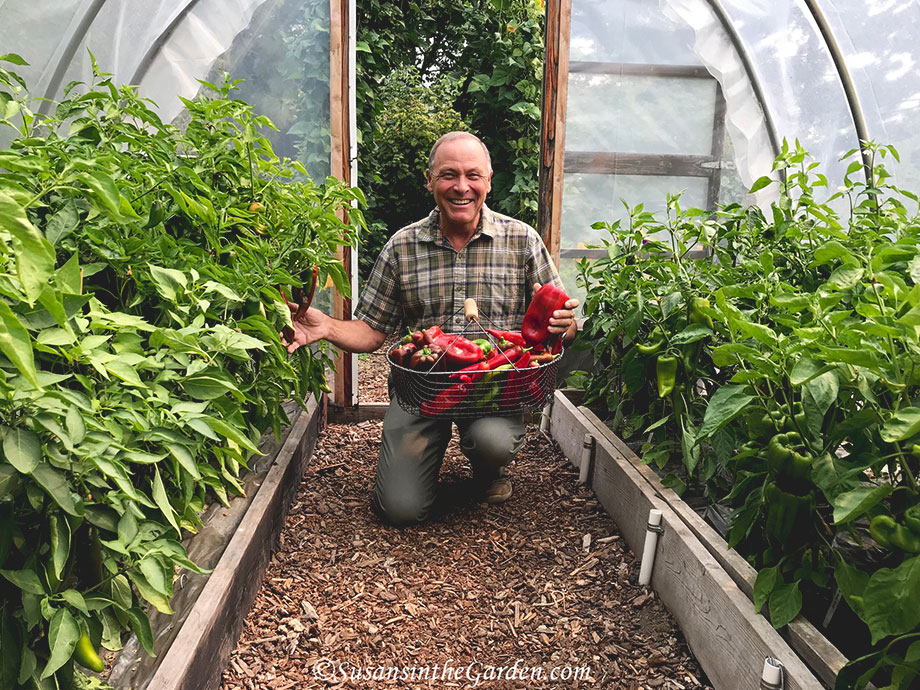Bill’s Tips for Growing Peppers

Earlier today, I posted a couple of photos of my husband Bill with one of his many pepper harvests. Folks are going wild over this and, of course, everyone wants to know what his secret is for growing peppers so successfully.
In 2020, I wrote a garden column about it that I thought you might enjoy reading, just in case you missed it the first time around. It contains his tips for growing peppers. It also has a bit of humor mixed in! The only thing that has changed since then, is that we’ve gotten away from using plastic sheet mulch for warming the soil in their beds.
Here’s the column in The Spokesman-Review: Husband shares secrets to his beautiful peppers (or you can read it below).
by Susan Mulvihill
I guess I’m going to have to swallow my pride today. In a 2018 column, I wrote about how my husband, Bill, has been trying to take over the vegetable garden. He particularly enjoys growing peppers and has slowly been expanding his allotted growing space whenever my back is turned.
When polling my Facebook followers on gardening topics they would be interested in learning more about this year, you can imagine my surprise — and dismay — when I read this one:
“How does your husband grow those beautiful peppers?”
Let’s not encourage him, folks. But since it’s early enough in the season to implement his growing tips, I asked Bill to share what’s he’s learned about growing peppers.
Apparently relishing his brief moment in the spotlight, he told me, “Along with onions and garlic, peppers are something I can grow where I’m not competing with you. You have all the glamorous vegetables: tomatoes, corn and green beans. It’s hard to brag about onions and garlic, but I can brag about growing peppers and some gardeners will appreciate that.”
Bill’s success with peppers can be attributed to the detailed notes he keeps on how well each variety germinates, the timing for transplanting them out into the garden, and keeping track of the best performers.
He starts the seeds indoors in early March – “when I can claim a bit of space under the grow lights” — planting three per cell of a seed-starting flat, placing it on a seedling heat mat, and later thinning the seedlings to the strongest plant.
“Once the seedlings have some true (mature) leaves, I start feeding them about twice a week with diluted nitrogen fertilizer,” he explained.
After a few weeks, the plants are up-potted into 4-inch containers, and later moved to our unheated greenhouse where they can slowly acclimate to the sunlight and temperatures. He transplants peppers in our small hoop house (a plastic-covered greenhouse) around May 1 and additional plants into the garden near the end of May.
“When preparing the growing beds, I add compost to the soil surface and a bit of organic tomato fertilizer, since tomato and pepper plants have the same nutritional needs,” Bill said. “Pepper plants prefer warm conditions so they don’t do well if they are planted into cold soil. I cover the bed with a sheet of plastic mulch a week ahead of time to increase the soil temperature, plant the seedlings and give them diluted fish fertilizer weekly until they start producing fruit.”
He usually has a few pests to deal with each year, with slugs being the most challenging.
“I sprinkle some diatomaceous earth around the base of the seedlings as a slug barrier but even then, they can still get to them,” he said. “I always keep a few extra plants in reserve just in case I need to replace one that’s been mortally wounded. Earwigs can also burrow into mature peppers and eat them from the inside.”
Last year, Bill was incensed to find mice had discovered how sweet the Jimmy Nardello peppers were and ate them right off the plants. By placing several mouse traps nearby, the problem was resolved within a week.
This year, he’s growing ‘Marconi Rosso’ and ‘Early Jalapeno’ (his two standbys), ‘Highlander’, ‘King Crimson’, ‘Aconcagua’ and ‘Jimmy Nardello’.
Talking about peppers soon had Bill enthusiastically looking forward to this year’s growing season. “Boy, if I just had four more beds to grow peppers in…,” he mused.
Don’t press your luck, honey.

